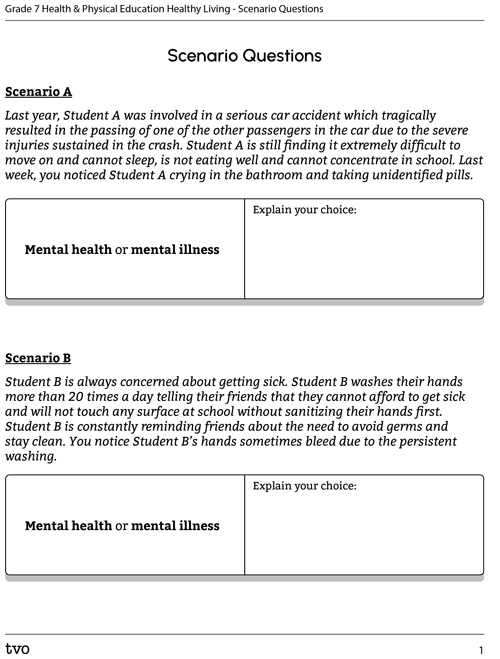Minds On
Fact or fiction

Mental health refers to a person's overall sense of well-being. If a person knows what they are capable of, when they need help, and when they have ups and downs, they can get through their day. A mental health disorder or a mental illness is a diagnosis from a medical doctor. If a person takes care of their mental health and has a sense of well-being and resilience, they can be mentally healthy even if they have a diagnosed mental illness.
There are many misconceptions about individuals who suffer from mental health disorders.
Because the symptoms are often difficult to recognize, it is important not to stigmatize against those who may be suffering in silence.
Press ‘Stigma’ to access what this word means.
Learning check!
Which of the following statements could be considered misconceptions about mental health disorders?
Use any prior knowledge you may have to help you with your thinking.
Select the correct answer, then press 'Check Answer' to see how you did.
Action
Mental health concerns
In the Minds On section, you considered some statements as either myths or facts. If you chose myth for each statement, you are correct. It is important to understand the terms mental health and mental illness.
What is the difference between mental health and mental illness?
Press ‘Let’s Check’ to access the meaning of these terms.
Mental health is our psychological and social-emotional well-being.
Mental illness are conditions that affects a person’s thinking, feeling, mood, or behaviour.
Signs of a mental health concern (according to Ontario.ca)
Many children and youth will exhibit different moods, thoughts, and behaviours at various times that can be part of normal childhood development.
These can include:
- getting significantly lower marks in school
- avoiding friends and family
- having frequent outbursts of anger
- changes to sleeping or eating habits
- acting out or rebelling against authority
- drinking a lot and/or using drugs
- not doing the things they used to enjoy
- worrying constantly
Press 'More' to access other signs of mental health concerns.
- experiencing frequent mood swing
- not concerned with one’s appearance
- obsessed with one’s weight
- lacking energy or motivation
- increased risk-taking behaviour
- feeling very down
But these characteristics and behaviours may be signs of an underlying mental health concern or disorder if they:
- are intense
- persist over long periods of time
- are inappropriate for the child’s age
- interfere with the child’s life
Some common mental health concerns include anxiety disorder, depression, schizophrenia, and bipolar disorder.
Press the following tabs to access more information on the different mental health concerns.
Learning check!
Select the correct answer, then press 'Check Answer' to see how you did.
Case study
Explore the following scenarios to help distinguish whether it represents a mental health issue or a mental illness. Circle your choice on the graphic organizer after each scenario. Provide a few comments to outline your thoughts about the events within the scenario.
Complete the Scenario Questions in your notebook or using the following fillable and printable document. You can also use another method of your choice to record your thoughts.
Press 'Let's Check' to access possible answers for these scenarios.
Student A: mental illness (persists over a long period of time)
Student B: mental illness (affects the child’s life)
Student C: mental illness (affects the child’s life)
Student D: not a mental health concern (common feeling of stress that is a temporary part of the child's life)
Pause and Reflect
Pause and reflect
In each of these scenarios:
- How could those close to these students support them?
- Would listening to how they are feeling help them?
- Would sharing concerns with trusted adults help?
Record your thoughts using a method of your choice.
Consolidation
Personal care pledge

You have explored some of the impacts of mental illness with aspects relating to physical and social-emotional well-being.
It is important to not only care for those around you who you feel might be suffering, but it is of utmost importance that you look after yourself.
Create a personal-care pledge to ensure the positive growth and development of your own well-being.
Within your pledge, include short-term and long-term goals, identifying various activities that you find enjoyable to help with your stress release.
Press ‘Personal Care Pledge’ to access an example to help you get started.
Short-term goal: e.g., provide opportunities to participate in learning a new skill like painting
Long-term goal: e.g., have a conversation with my trusted adult about developing a plan to share if I need some support
My enjoyable activities: e.g., reading, strolling outside through the park
Complete the Personal Care Pledge in your notebook or using the following fillable and printable document. You can also use another method of your choice to record your thoughts.
| Short term goal: |
| Long term goal: |
| My enjoyable activities: |
Press the ‘Activity’ button to access the Personal Care Pledge.
Reflection
As you read the following descriptions, select the one that best describes your current understanding of the learning in this activity. Press the corresponding button once you have made your choice.
I feel...
Now, expand on your ideas by recording your thoughts using a voice recorder, speech-to-text, or writing tool.
Discover MoreBe sure to be active!
Physical activity has proven to be an excellent method of improving overall mental health and well-being.
Explore the following TVO Kids videos.
Choose one that you feel would be a suitable challenge for others who wish to incorporate physical activity in their day or design your own movement routine that could easily be incorporated into someone’s day.
Explain how your chosen routine could inspire others and help to improve overall mental health and well-being.
Record your ideas using a method of your choice.
